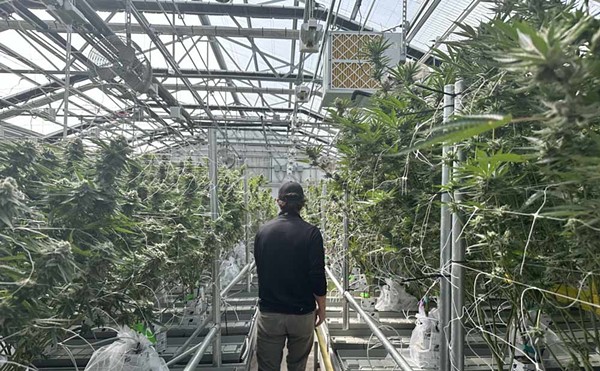Florida Supreme Court to take unusual second look at 2016 medical marijuana amendment
By The News Service of Florida on Sat, Oct 3, 2020 at 4:01 pm
In an unusual move, the Florida Supreme Court is poised to hold a second round of arguments in a high-stakes case about whether the state has properly carried out a 2016 constitutional amendment that broadly legalized medical marijuana.
Justices heard arguments in May in a lawsuit filed by Florigrown, a Tampa-based firm that has challenged the constitutionality of a 2017 law that was designed to carry out the constitutional amendment. The case centers on parts of the law related to the licensing of companies to operate in the medical-marijuana industry.
But in July, the Supreme Court scheduled another round of arguments on an issue that was not a focus of the first hearing —- whether the 2017 law is what is known as an unconstitutional “special” law. Justices will hear arguments Wednesday.
The Florida Constitution bars “special” laws that, generally, are intended to benefit specific entities. Florigrown, which has unsuccessfully sought a medical-marijuana license, contends that parts of the 2017 law improperly limited the firms that could take part in the industry.
“This (Supreme) Court has repeatedly held that the controlling question in evaluating whether a law is an unconstitutional special law is whether the class in the law is ‘closed,’” Florigrown lawyers wrote in a brief. “Here, the classes are so clearly closed, the Legislature might as well have named the licensees in the statute.”
But lawyers for the Florida Department of Health, which administers the medical-marijuana system, contended in a brief that the 2017 law “ultimately establishes a comprehensive and unified statutory system for the statewide licensure and regulation” of medical-marijuana firms.
The case is being closely watched in the medical-marijuana industry, where companies have engaged in large amounts of litigation involving licenses. The Department of Health appealed to the Supreme Court after lower courts sided with Florigrown.
The case has focused heavily on a requirement that the Legislature put in the 2017 law that licensed companies must be able to handle all aspects of the business, including growing, processing and distributing products —- a concept known as a “vertical integration” system.
Florigrown has argued that was not the intent of the constitutional amendment and that a vertical integration system limits the number of companies that can take part in the industry. The alternative would be a system where firms could perform different aspects of the business, known as a “horizontal” structure.
_
Please follow CDC guidelines and Orange County advisories to stay safe, and please support this free publication. Our small but mighty team is working tirelessly to bring you news on how coronavirus is affecting Central Florida. Please consider making a one-time or monthly donation. Every little bit helps.
Justices heard arguments in May in a lawsuit filed by Florigrown, a Tampa-based firm that has challenged the constitutionality of a 2017 law that was designed to carry out the constitutional amendment. The case centers on parts of the law related to the licensing of companies to operate in the medical-marijuana industry.
But in July, the Supreme Court scheduled another round of arguments on an issue that was not a focus of the first hearing —- whether the 2017 law is what is known as an unconstitutional “special” law. Justices will hear arguments Wednesday.
The Florida Constitution bars “special” laws that, generally, are intended to benefit specific entities. Florigrown, which has unsuccessfully sought a medical-marijuana license, contends that parts of the 2017 law improperly limited the firms that could take part in the industry.
“This (Supreme) Court has repeatedly held that the controlling question in evaluating whether a law is an unconstitutional special law is whether the class in the law is ‘closed,’” Florigrown lawyers wrote in a brief. “Here, the classes are so clearly closed, the Legislature might as well have named the licensees in the statute.”
But lawyers for the Florida Department of Health, which administers the medical-marijuana system, contended in a brief that the 2017 law “ultimately establishes a comprehensive and unified statutory system for the statewide licensure and regulation” of medical-marijuana firms.
The case is being closely watched in the medical-marijuana industry, where companies have engaged in large amounts of litigation involving licenses. The Department of Health appealed to the Supreme Court after lower courts sided with Florigrown.
The case has focused heavily on a requirement that the Legislature put in the 2017 law that licensed companies must be able to handle all aspects of the business, including growing, processing and distributing products —- a concept known as a “vertical integration” system.
Florigrown has argued that was not the intent of the constitutional amendment and that a vertical integration system limits the number of companies that can take part in the industry. The alternative would be a system where firms could perform different aspects of the business, known as a “horizontal” structure.
_
Please follow CDC guidelines and Orange County advisories to stay safe, and please support this free publication. Our small but mighty team is working tirelessly to bring you news on how coronavirus is affecting Central Florida. Please consider making a one-time or monthly donation. Every little bit helps.
Tags:

WE LOVE OUR READERS!
Since 1990, Orlando Weekly has served as the free, independent voice of Orlando, and we want to keep it that way.
Becoming an Orlando Weekly Supporter for as little as $5 a month allows us to continue offering readers access to our coverage of local news, food, nightlife, events, and culture with no paywalls.
Scroll to read more Legislative Updates articles
Newsletters
Join Orlando Weekly Newsletters
Subscribe now to get the latest news delivered right to your inbox.
















